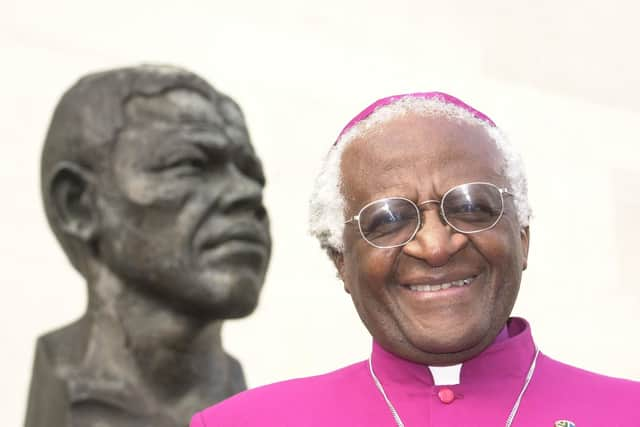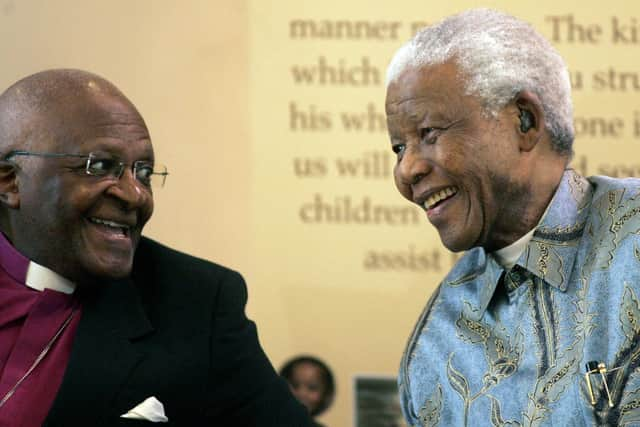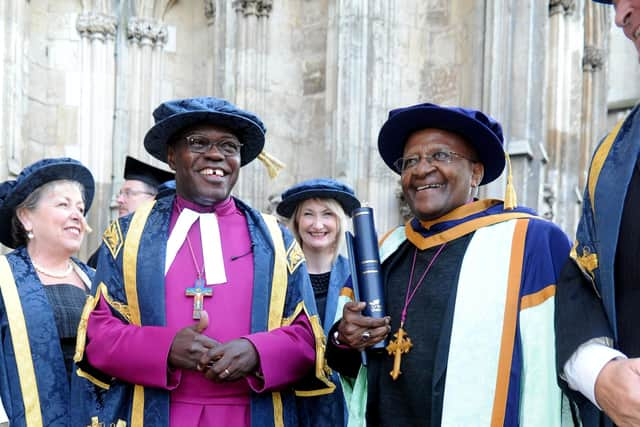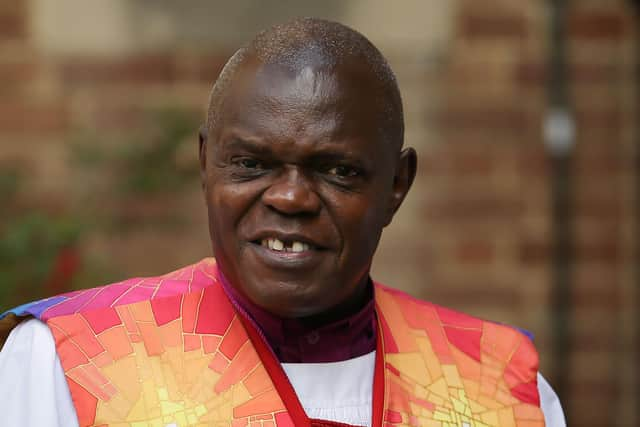‘Desmond Tutu: He loved; He laughed; He cried; He was forgiven; he forgave’ – John Sentamu’s personal tribute


His political activism was distinctive. It stemmed from his encounter of God in Jesus Christ – a God of justice and mercy who rejoices that all humanity belongs to the One human Race, made in the image and likeness of God, and that each person is of unique worth in God’s sight.
Advertisement
Hide AdAdvertisement
Hide AdAn early influence on his life was the Anglican monk, from the Community of the Resurrection in West Yorkshire, Trevor Huddleston, who later became one of my predecessors as Bishop of Stepney and later as Archbishop of the Indian Ocean!


When Huddleston, working in Sophiatown, a suburb of Johannesburg for black residents, doffed his Yorkshire cap to Tutu’s mother, who was his house keeper, this mark of respect so impressed nine-year-old Desmond that he decided that would one day become a priest.
Huddleston’s fierce opposition to apartheid, chronicled in his book Naught For Your Comfort, and his support for Desmond during his two-year hospitalisation with tuberculosis, had a marked influence on both. “Those days and those visits are amongst my most precious memories of what was, for me, the golden age of my whole ministry,” commented Huddleston, reflecting on his shared memories with Tutu. Desmond and his wife Leah named their first child Trevor.
After initial training in South Africa, the Tutus moved to London for his advanced theological studies, coupled with an assistant post at a church in Surrey, where he encouraged collaboration with Christians of all denominations. Further studies in Jerusalem helped him qualify or teaching posts back in South Africa, and later in the UK.
Advertisement
Hide AdAdvertisement
Hide AdHe developed an interest in Black theology, which he defined as seeking “to make sense of the life experience of the black man, which is largely black suffering at the hands of rampant white racism, and to understand this in the light of what God has said about himself, about man, and about the world in his very definite Word … the liberation of the black man is the other side of the liberation of the white man — so it is concerned with human liberation”.


He was to become the first black Dean of the Anglican Cathedral of Johannesburg, then Bishop of Lesotho, before being appointed General-Secretary of the South African Council of Churches, which he described as “neither a black nor a white organisation. It is a Christian organisation with a definite bias in favour of the oppressed and the exploited ones of our society”.
In 1985 he became Bishop of Johannesburg, despite opposition from the white laity. At his inaugural service he preached and said this: “We face a catastrophe in this land and only the action of the international community by applying pressure can save us.
“Our children are dying. Our land is bleeding and burning and so I call the international community to apply punitive sanctions against this government to help us establish a new South Africa – non-racial, democratic, participatory and just …”
Advertisement
Hide AdAdvertisement
Hide AdI was invited on the BBC Breakfast Show in solidarity with Tutu who had been maligned that he had abandoned his Christian vocation of saving souls and was meddling in politics. His response was “Which Bible are people reading? Jesus brought love and justice. Politics must deliver love and justice”! To which I said ‘Amen’.


In 1986, Desmond Tutu became the first black Archbishop of Cape Town, and a prominent figure in the worldwide Anglican Communion. When out of the limelight he was routinely at worship, day by day.
At the 1988 Lambeth Conference the staff noticed that, when all the other delegates had left the converted gymnasium used for worship, Tutu remained, praying silently. Later, one of them had to relay a media request for an interview and phoned the room where the Tutus were staying. Leah answered the call. “He’s on his knees,” she said. “You’ll have to try later.”
There had been unsubstantiated rumours of a rift between the Archbishop of Canterbury, Robert Runcie, who chaired the Conference, and some of the 500+ bishops present. At the concluding session of the Conference, Tutu orchestrated an invasion of the platform by all the Primates (Archbishops) who mobbed Runcie, to the cheers of all present.
Advertisement
Hide AdAdvertisement
Hide AdIn retirement, Tutu was diagnosed with prostate cancer. He let this be known publicly, to encourage men to overcome their reticence and seek medical advice.


History may regard his greatest achievement as Chair of South Africa’s Truth and Reconciliation Commission. This was a government project, but utterly Christian in concept, shunning retributive justice in favour of restorative justice.
It invited those who had perpetrated abuses during the apartheid regime to acknowledge what they had done, and to be granted amnesty from prosecution, before making such restitution to victims as was possible. On reflection, Archbishop Tutu said to me: “We should have included ‘Justice’ in our remit.”
The Commission itself comprised unlikely bedfellows: former pro- apartheid members and those who had been anti-apartheid activists. He described them as “a bunch of prima donnas” and insisted on beginning each session with Christian prayers.
Advertisement
Hide AdAdvertisement
Hide AdThe burden for Tutu was immense; the testimony of victims was harrowing, often reducing him to tears. Every day of his life he had prayed “forgive us our trespasses as we forgive those who trespass against us”.
On the day he launched my Archbishop of York Youth Trust, he said to me that his epitaph should read “Desmond Tutu: He loved; He laughed; He cried; He was forgiven; he forgave”. He rests in worship and he will rise in Glory. Amen.
Lord Sentamu is the former Archbishop of York.
Support The Yorkshire Post and become a subscriber today. Your subscription will help us to continue to bring quality news to the people of Yorkshire. In return, you’ll see fewer ads on site, get free access to our app, receive exclusive members-only offers and access to all premium content and columns. Click here to subscribe.
Comment Guidelines
National World encourages reader discussion on our stories. User feedback, insights and back-and-forth exchanges add a rich layer of context to reporting. Please review our Community Guidelines before commenting.